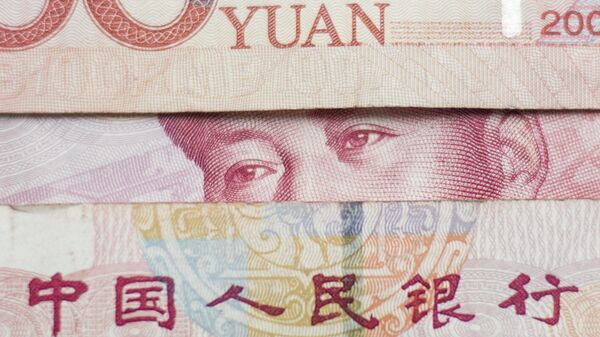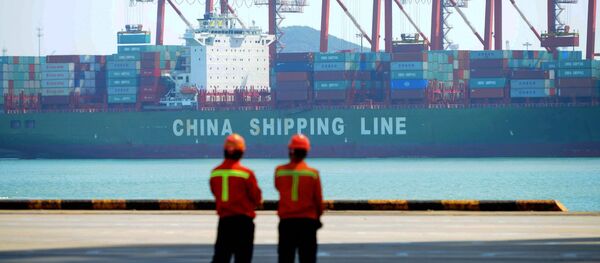Kristian Rouz — Mainland China's economy is facing mounting downside risks after US President Donald Trump imposed a new round of tariffs against Chinese products. Despite the Chinese currency, the renminbi, taking a blow in the currency markets, Chinese stocks were supported by investor expectations of Beijing's infrastructure development package.
READ MORE: Trump Imposes New Tariffs on $200 Billion Worth of Chinese Imports
The rising trade tensions could pose a challenge, not only to China's economic growth, but also Beijing's plans for gradual economic adjustment, designed to make the Chinese economy less reliant on exports and increasingly driven by domestic consumption.
In this light, Chinese investors are now expecting Beijing to ramp up its effort to reform the economy. The central government's first step could be fiscal stimulus in the form of increased government spending on roads, bridges, and other infrastructure objects.
Another possible option could be a further devaluation of the renminbi to spur China's exports to other parts of the world.
"The risk and the sluggish domestic demand may exert depreciation pressure on the RMB (renminbi), which may partly offset the tariff impact," Liu Li-gang of Citigroup said. The best solution, however, would be to "accelerate domestic reforms and grow out of the tariff war," Liu added.
The Trump administration, however, also offered China trade talks before enacting the new tariffs. Washington said it expected China to bring down its trade barriers and lift regulatory restrictions on foreign companies operating in its domestic market.
READ MORE: Record Low Number of Americans Consider Economic Issues Top US Problem — Poll
However, the Chinese authorities said such talks wouldn't be possible if the US chooses to enact more tariffs — which Trump subsequently did.
The Mainland's Vice Premier Liu He — known as the mastermind behind President Xi's trade policies — is now set to hold a government session on Tuesday to discuss ways of addressing the new tariffs. So far, Beijing has considered retaliation against the US, but China only imported roughly $130 bln worth of goods from the US last year, while US imports from China stood at $505.5 bln.
READ MORE: Tariff War Won't Solve US Trade Deficit — China's Ministry of Commerce
This means China is lacking enough firepower to address Trump's tariffs with retaliatory measures, and Beijing will likely have to improvise. Or sit down for talks.
"The market will watch out for China's possible reaction to the new round of trade tariffs. China is likely to reject the invitation from the US Treasury for the new round of trade talks," analysts from OCBC Bank said.
Most recent dynamics in China's financial markets might be indicative of Beijing's looming policies. Chinese infrastructure stocks rose 2 percent amid market anxiety Monday, with investors saying Beijing will now ‘most definitely' ramp up infrastructure investment to support business revenues, create jobs, and bolster economic growth.
"China has suffered worse hardships in the past, and I believe some Chinese companies will emerge out of the trade war much stronger," Wen Feng of Shanghai-based hedge fund V-Invest Co Ltd. said.
However, some economists suggest the Chinese government would have to increase its borrowing in order to finance its fiscal incentives and infrastructure projects. This could exacerbate China's complicated struggle against the mounting levels of provincial and corporate debt, as well as shadow banking and ‘hidden debt'.
While China could afford elevated debt levels amid its buoyant economic expansion in the first part of this decade, now that the growth has moderated, borrowing might become a somewhat tougher challenge.
"After benefiting from persistent upgrades for almost two years, China is now starting to witness downgrades," analysts from Hong Kong-based investment group CLSA wrote in a note.
Amid the lingering uncertainty and the occasionally belligerent rhetoric on both sides, the US-Chinese trade spat could eventually result in a mutually-beneficial trade deal.
However, even if serious and constructive negotiations actually commence and subsequently succeed, a new concern for both sides would be making the deal verifiable and transparent — which could be even harder amid the battered mutual trust.




